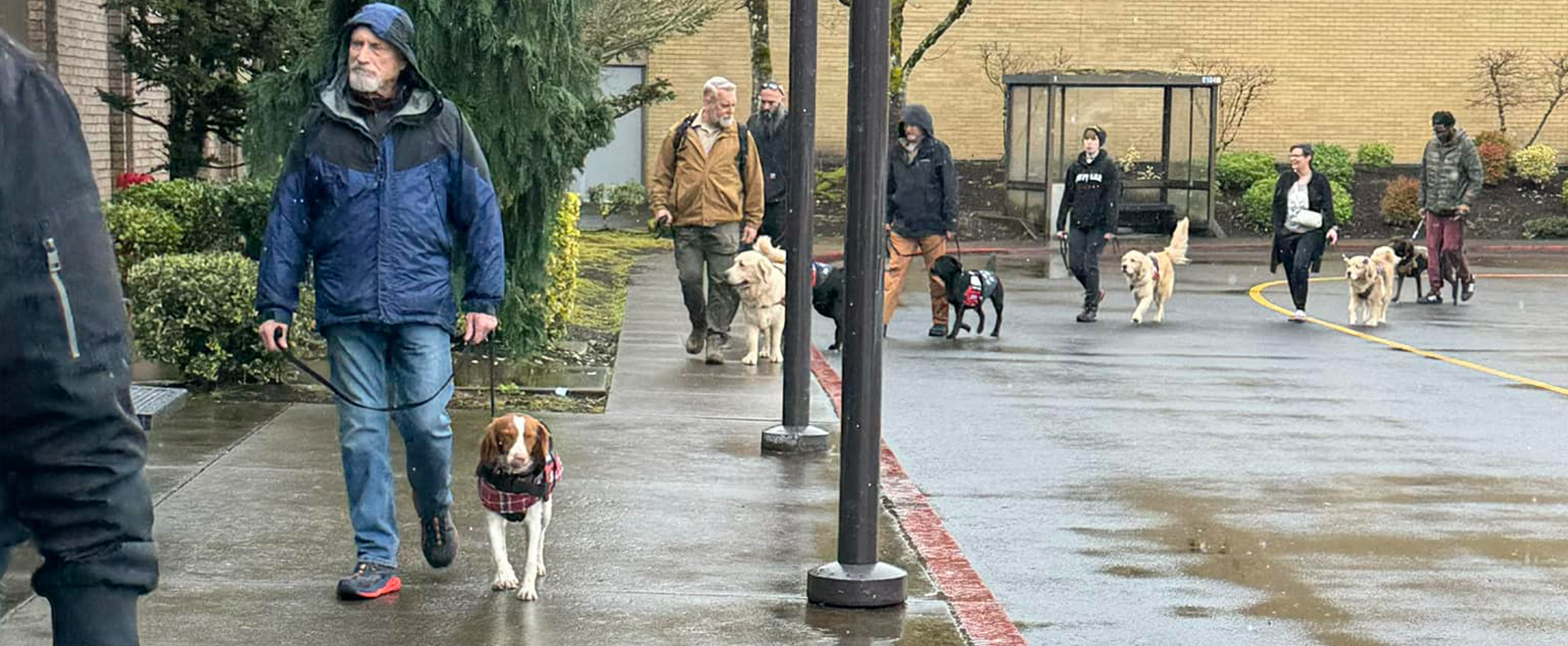Service Dog Etiquette: Dos and Don'ts
It’s important to remember that service dogs are working animals, not pets. There is a certain level of respect to consider when encountering a trained service dog in public.
Service dogs can provide crucial, lifechanging services for many types of disabilities, from providing balance support to mitigating the symptoms of post-traumatic stress disorder (PTSD).
When you see a service dog, consider these dos and don’ts for good service dog etiquette, whether you’re a handler’s friend, family member, or just a curious member of the public.
At Northwest Battle Buddies, we pair professionally trained PTSD service dogs with Veteran handlers at no cost to the Veteran thanks to generous support. Give back with a monthly donation.
How to Show Good Service Dog Etiquette
Do respect the handler’s instructions for good service dog etiquette
It’s easy for animal lovers to want to interact with a service dog, potentially overlooking what the handler needs. But it’s important to respect the handler’s instructions.
As a family member, for example, you might think you’re an exception to the rule. Often, it puts our Veteran handlers in a very difficult position.
You can support service dog handlers and show good service dog etiquette by listening to what the handler asks (like not petting a dog while it’s working) and following their directions when you’re around their service dog.
Do treat the handler like you would anyone else
The best thing you can do when you encounter a handler with a service dog is to treat the handler like any other person. Many of the Veterans we work with initially feel like they have a spotlight on them when all they want to do is blend in.
If you walk by someone in a wheelchair, you’d likely smile and give them space as they go by. Handlers appreciate the same thing.
The best thing to do when you encounter a service dog in public is to pretend the dog is not there and interact with the handler like you would anyone else. This will allow the dog to do its job and ensure you don’t disrupt the dog-handler working relationship while helping the handler feel comfortable.
Do keep your dog under control when you’re around a service dog
If you’re out and about with your pet, be sure to give working service dogs plenty of space. Service dogs are not out in public to play or engage with other dogs. They are working when their vest or harness is on! Service dogs and their handlers have the right of way, so give them that respect and always allow them to go first when you see them out in public.
Unruly dogs are common distractions for the PTSD service dogs we train. Often, we run into dogs that bark, growl, and show aggression while we are in a store. A business has every right to ask those handlers to leave, but often nothing happens, and they continue to be allowed in the store. Our professionally-trained dogs do not react in these situations, but it is an additional factor for our Veterans to be aware of so they can keep their dog safe.
Ways to Avoid Bad Service Dog Etiquette
Don’t distract a service dog
Disruptive situations can vary greatly depending on the individual dog and the handler. But in general, some good rules of thumb to avoid distracting a service dog include:
- Allow the dog to continue to focus on its handler and keep that individual safe.
- Always communicate with the handler, not the dog. The dog is working.
- Don’t attempt to feed or talk to the dog.
- Don’t deliberately make eye contact with a working service dog; it is disruptive.
- Don’t assume you can pet a service animal.
It’s a common misconception that it is appropriate to go up to a handler and ask to pet their dog. While this is good etiquette for a non-service dog, it’s not appropriate with a service dog who’s wearing a vest and clearly on duty.
Service dogs are considered medical devices, like wheelchairs. No one would walk up to someone and ask to touch or interact with their cane or wheelchair. It’s important to give the service dog that same respect.
Don’t make assumptions about service dogs and their handlers
It’s good service dog etiquette to leave assumptions at the door when you see a working animal out in public. PTSD service dogs from Northwest Battle Buddies help their Veteran handlers battling PTSD, and there are many different kinds of service dogs trained for different tasks, which might not be obvious just by looking at someone.
Many people have an image of a service dog being a guide dog for blind handlers. A guide dog for the blind is taught very differently than a PTSD service dog that we train at Northwest Battle Buddies, but they both are excellent roles for the dog to fill. Guide dogs for the blind are taught to lead the handler, whereas we teach our Veterans to lead their dogs.
One of the biggest misconceptions: if there is nothing visibly wrong with the handler, people think the dog is in training or is an emotional support animal. Service dogs come in all shapes and sizes and perform all kinds of different tasks. Invisible disabilities like PTSD aren’t always obvious just by looking at someone, but that doesn’t mean that a service dog isn’t an essential component of their medical care.
Show your support for Veterans battling PTSD by making a donation to Northwest Battle Buddies, helping pair PTSD service dogs with the handlers who need them.

